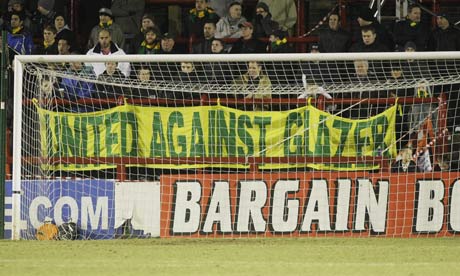
Manchester United are giving strong consideration to increasing season-ticket prices to help with the club's enormous interest payments, despite being acutely aware such a move would increase the sense of animosity that has led to fans protesting against the ruling Glazer family.
The Glazers have begun discussions with the club's England-based directors about next season's prices, with an official announcement due in the next month, and the early talks have been geared towards United continuing their habit of making supporters pay more every year since the Americans took control in 2005.
Season tickets have gone up by an average of 48% in that time, and by as much as 69% in some areas of Old Trafford, but the Glazers are said to be largely unmoved by the prospect of further antagonising the supporters, placing more emphasis on how to increase match-day revenue at a time when the club have £700m-plus worth of borrowings and paid £67m in interest payments last year.
The alternative is that the Glazers freeze or lower prices, as they have done with their NFL team the Tampa Bay Buccaneers, but, as yet, that idea has been discussed only briefly. Indeed, there is a sense that the situation in Florida may push the Glazers further towards bumping up the prices at Old Trafford. One source close to the family explained their thinking: "Will the club's financial issues affect their decision-making? Yes. Will the current climate of the protests and support anger influence them? Not at all."
United were the only club in the Premier League not to reduce or freeze season-ticket prices for the current season, when the trend throughout the rest of English football's top division was to recognise there was a significant threat of pricing supporters away from the game in a time of recession. Instead, the Premier League champions asked their 55,000 season-ticket holders to pay an extra £1 for each match, calculating it would bring in an extra £1m from their 19 Premier League home matches.
That hike attracted strong criticism from supporters' groups and there was more anger in January when the Glazers launched a prospectus in January to seek £500m worth of new bond loans. "While other Premier League clubs have experienced a flattening or reduction in ticket prices in response to the economic downturn, we were able to increase aggregate ticket prices for the 2009-10 season by 2.5%," it read.
Season-ticket holders are currently paying up to £931 and another rise would be "commercial suicide" according to Andy Mitten, the editor of United We Stand fanzine. "United are the best-supported team in the world this season but where there was once a waiting list for any season tickets, the continued price rises have diminished demand. Fans have been priced out to the point that we are now seeing empty seats inside Old Trafford for league games for the first time since 1992."
The Manchester United Supporters Trust expects that many fans will not renew, adhering to the belief that if enough of them effectively go on strike it will affect the Glazers' business plan enough to persuade them to sever their ties with the club.
This idea has the backing of the Red Knights, the consortium of businessmen and financiers led by the former United director Jim O'Neill and involving the former Football League chairman Keith Harris, who are trying to put in place a takeover deal. Their plan is to reward boycotters by guaranteeing them a season-ticket, at a reduced price, if their takeover is successful.

